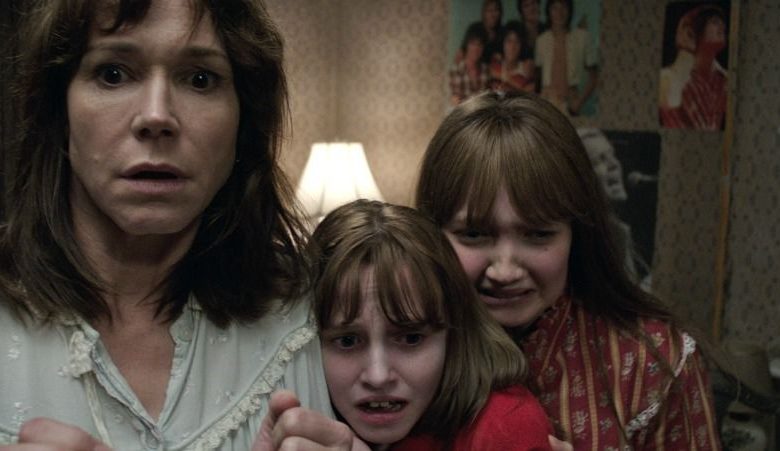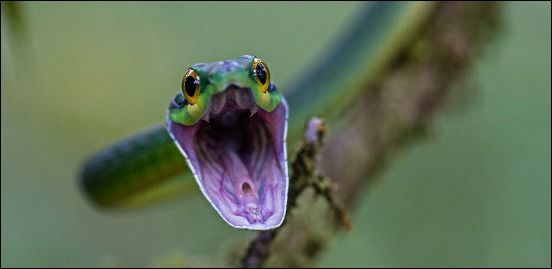Revealed: Why We Love Horror Movies

A horror film can deliver a few scares, much like a mediocre comedy can instill some scattered laughs. A great horror movie, though, features scares that leave a mark. And they’re few and far between, just like gut-busting comedies.
Why is that?
If a horror movie stays true to its deep psychological underpinnings, you’ll have a memorable film. If it lacks that deep psychological underpinning, then it’s a mess.
It’s less about special effects or jump cuts and more to do with the psychological “truth” the movie is exploring. We humans have real fears, and a good horror movie taps into them with the skill of a surgeon.
Five Common Fears
Most psychologists agree that there are only five basic fears, out of which almost all of our other so-called fears are manufactured:
(List courtesy of Karl Albrecht Ph.D., Psychology Today)
- Extinction—The fear of annihilation, of ceasing to exist. This is a more fundamental way to express it than just calling it “fear of death.” The idea of no longer being arouses a primary existential anxiety in all normal humans.
- Mutilation—The fear of losing any part of our precious bodily structure; the thought of having our body’s boundaries invaded, or of losing the integrity of any organ, body part or natural function.
- Loss of Autonomy—The fear of being immobilized, paralyzed, restricted, enveloped, overwhelmed, entrapped, imprisoned, smothered or otherwise controlled by circumstances beyond our control.
- Separation—The fear of abandonment, rejection, and loss of connectedness; of becoming a non-person—not wanted, respected, or valued by anyone else.
- Ego-death—The fear of humiliation, shame, or any other mechanism of profound self-disapproval that threatens the loss of integrity of the Self; the fear of the shattering or disintegration of one’s constructed sense of lovability, capability, and worthiness.
I don’t think this is an exhaustive list, but it speaks to the common fears we all share. It’s helpful to get more specific. So here would be my list of fears tapped into by horror, arranged by category:
- Sex, Relationships, Love — Bad marriage, spouse goes crazy/evil, bad parenting or bad parent(s), loss of a child, bad seed, impotence, infertility, birth defects (monster), bad teachers, bad doctors and bad neighbors.
- Self — Loss of identity, mutilation, extension, going crazy, loss of authority, loss of freedom, sickness and/or disease, loss of faculties, depending on strangers, loss of finances and wealth, fear of success, fear of poverty, fear of rejection from group, abandonment, isolation and/or dying alone, self sabotage and possession
- The Other — Strangers, aliens, hillbillies, ghosts, vampires, nature, etc.
- Nature — (The wild inside ourselves and the other) is where we meet our darkest fears and desires.
Differences Between Fear, Phobia and Anxiety
Most of us experience a degree of fear, and that’s a good thing. Fear keeps us from doing stupid things, like touching a hot stove or racing a train to a crossing.
It helps us make better decisions.
For example, most humans will naturally recoil in the presence of a snake or spider, both of which can on rare occasions kill a human with their bite.
RELATED: Why ‘Hush’ Is Your Next Horror Addiction
There was a famous anthropological study done that showed children who lived on an island without snakes (and had never seen a snake before) would recoil when shown pictures of snakes.
Many people are scared of spiders and, generally speaking, I think most of us fear one of the following— snakes, spiders, insects rats or bats.
Being afraid of a spider or snake isn’t a phobia.
A phobia is when a fear of a particular object is so intense that it prevents a person from living their life. It becomes an obsession.
Most of us naturally shy from snakes, but very few of us build our lives around the avoidance of snakes. Nor do we fear snakes even when they’re not around.
Anxiety is an unease and wariness at a physical and emotional level that is generally unspecific. Something triggers the fight or flight response, but it’s hard to put a finger on what’s specifically causing the fear.
As a general rule, good horror will shy away from phobias. Think about 2010’s “Devil” where a group of people were trapped in an elevator with the devil. It gave us some chills, but because it tied to a specific phobia it couldn’t get our pulses racing.
RELATED: Horror Vet Lynch Defends Our Need for Nightmares
Other films tap more directly into our fears and, as a result, are difficult to forget.
Here are few of the truly great horror movies and the psychological fears they summon:
- The Babadook — Fear of motherhood and/or bad seed. Like “The Omen,” this movie explores postpartum depression and the struggles of raising a difficult child.
- The Witch — Abandonment by the community and forced to face true nature.
- It Follows — Sex opening an awareness on entropy.
- The Shining — Bad marriage, spouse gone nuts.
- The Cabin In The Woods — A meta fear similar to “The Matrix” that we’re in a simulation.
- The Thing — Unpredictable “alienness” of human nature.
- The Conjuring — Bad parent.
- The Conjuring 2 — Missing parent.
- Invasion of the Body Snatchers — Infected by “alien” culture. The other.
- The Silence of the Lambs — A sadistic teacher, basically the same story as “An Officer and a Gentleman”
- Evil Dead — Horror of addiction and loss of self.
- Drag Me To Hell — Poverty.
- Hostel — Loss of self from exposure to other cultures.
- Let The Right One In — Bad parent, dangerous adults.
- Attack the Block — Gentrification.
- Mama — Motherhood.
- The Devil’s Backbone — Loss of a parent.
- Antichrist — Bad/crazy spouse. Woman as nature (destruction)
- Repulsion — Sex as a doorway to entropy.
- The Descent — Human nature, men/sexuality as loss of freedom.
- Angel Heart — Loss of identity (ego) as path to discovery of true human nature
- The Other — “Warging” before warging was cool… The “other” as in non-human nature.
- Poltergeist — Loss of a child.
Take a look at your favorite scary movie. Here’s betting behind the jump cuts, special effects and eerie music there’s a psychological fear being explored. The more the movie honors that fear, and stays true to it, the bigger the frights.
Photo credit: Andy Morffew via Foter.com / CC BY-ND

